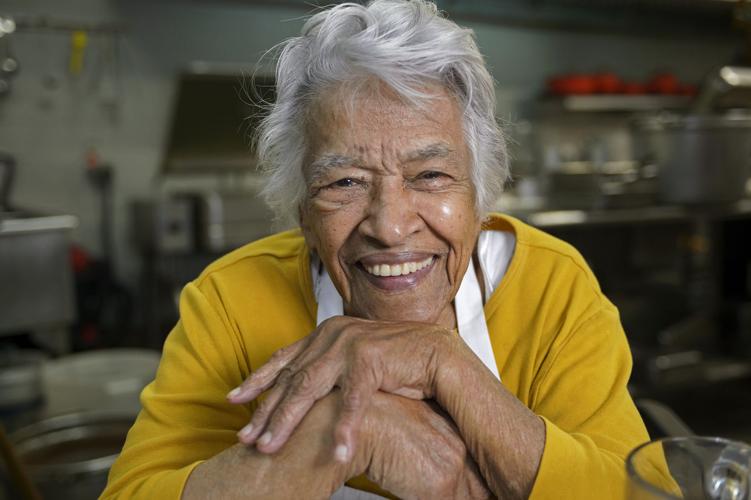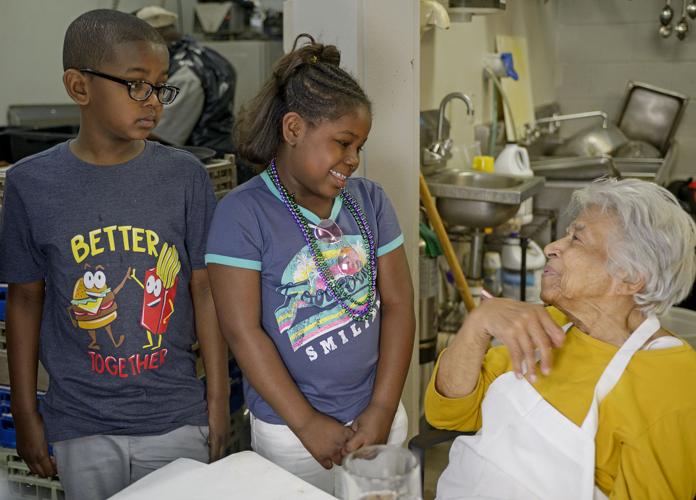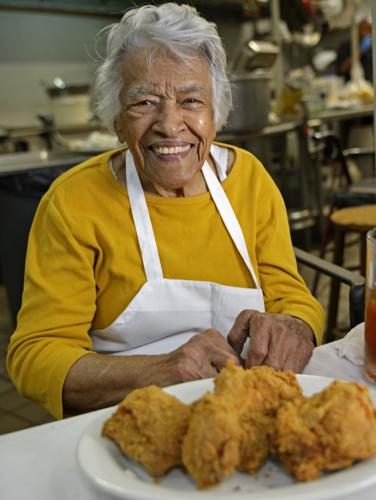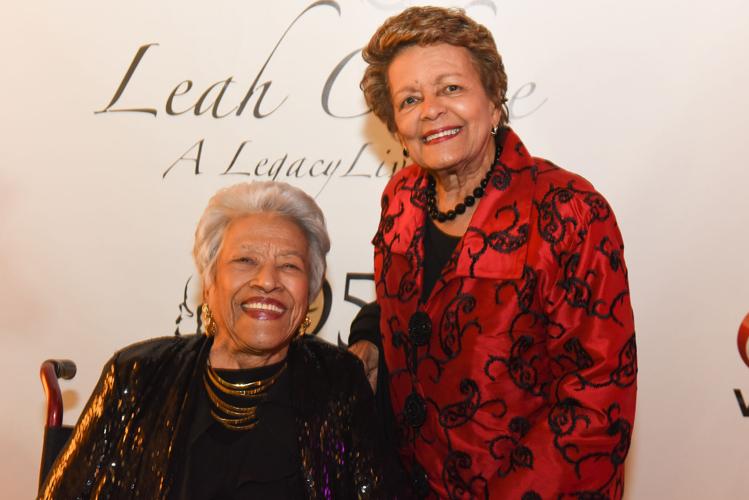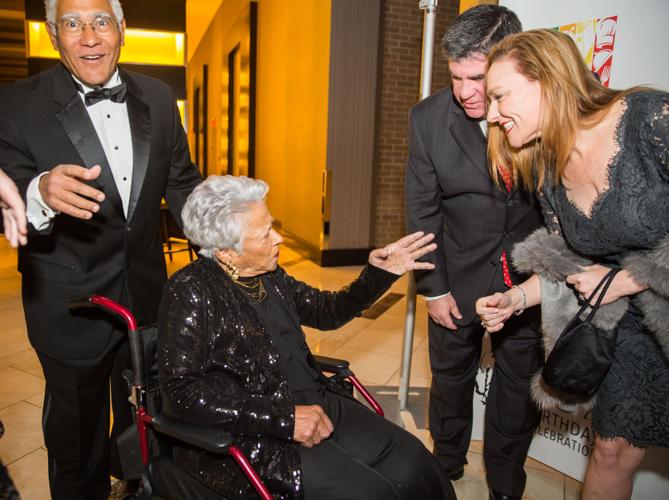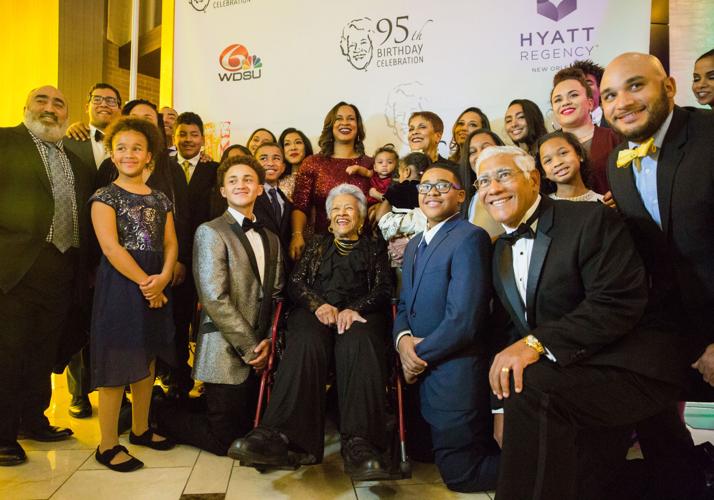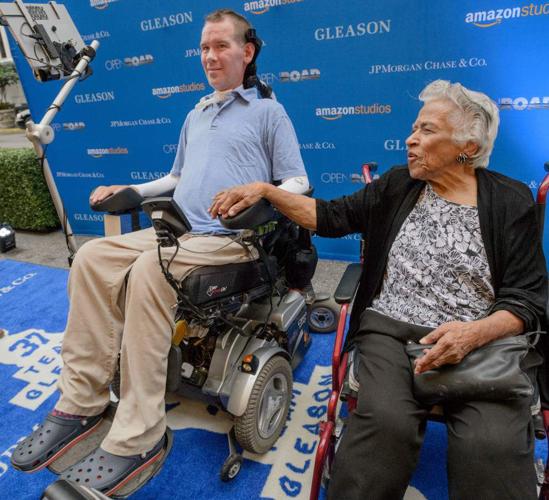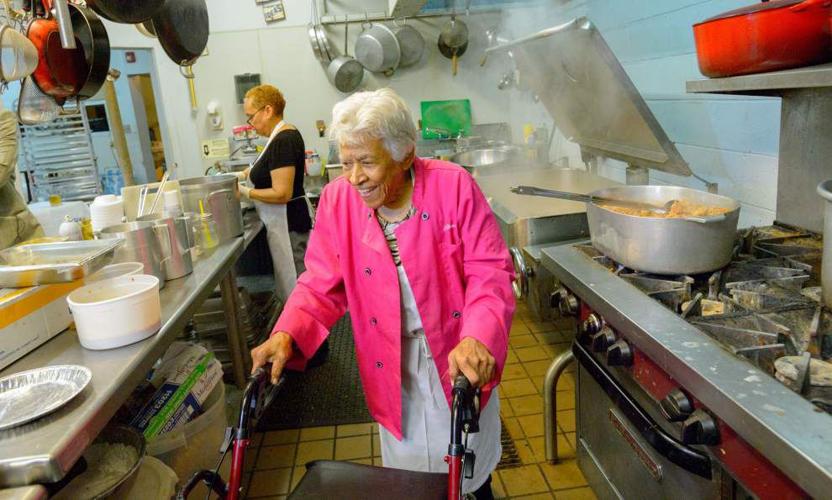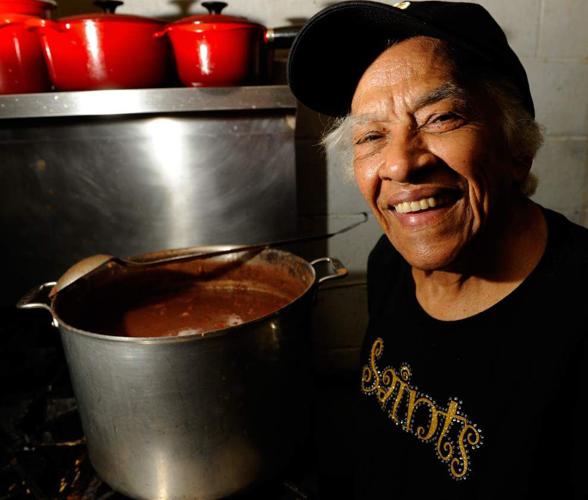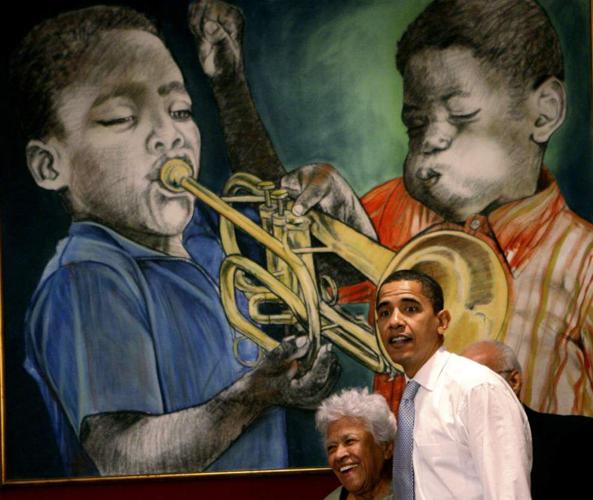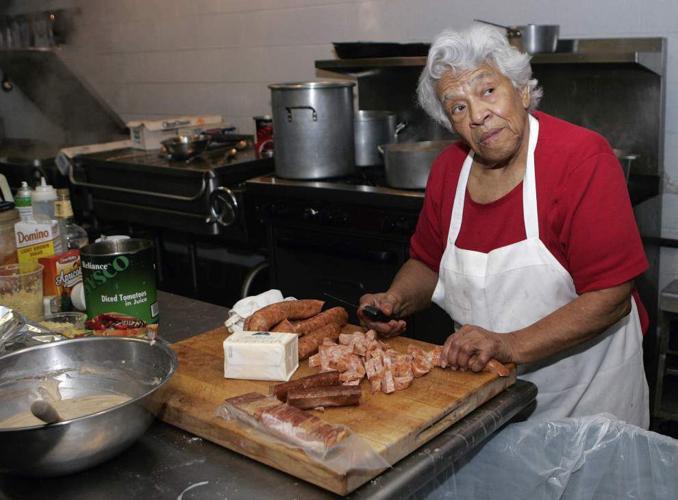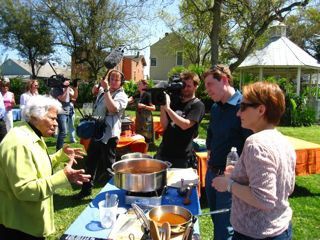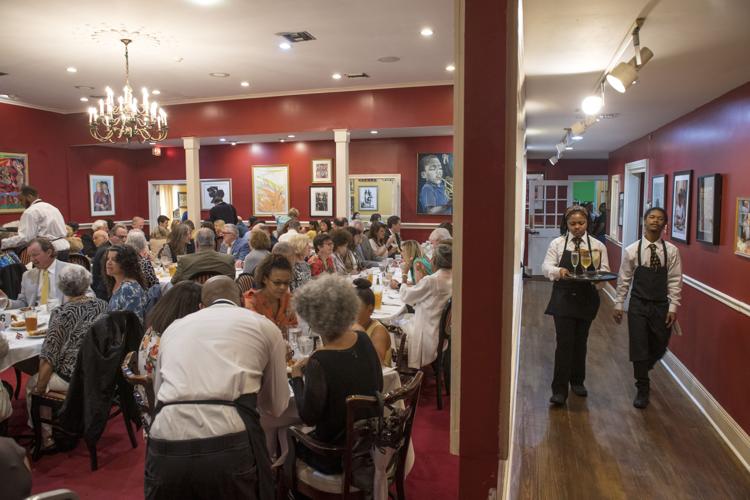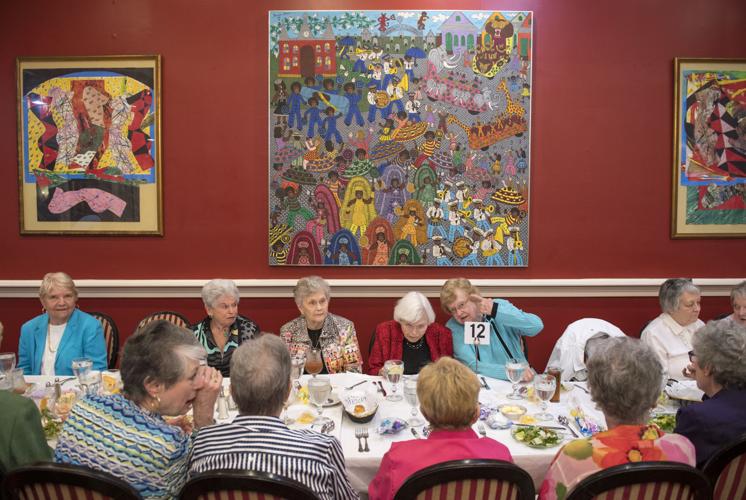In New Orleans, Leah Chase has long been lauded as a leader, an inspiration, even an emblem of her city’s better self.
But through it all she remained a chef, forever directing her staff and greeting her guests, her hands always busy preparing "the trinity," stirring the gumbo.
Now, finally, those hands are still.
Chase died Saturday, surrounded by her family, according to a family spokesperson. She was 96.
Mayor LaToya Cantrell said she was “a legend, an icon and an inspiration. It is impossible to overstate what she meant to our city and to our community. At Dooky Chase’s Restaurant, she made Creole cuisine the cultural force that it is today, she made a family-owned sandwich shop into one of the first African-American fine dining restaurants in the country, and she made history — with Dooky’s serving as a cradle and a hot spot for the civil rights movement."
Former City Councilman Arnie Fielkow said, "New Orleans and the entire world have lost one of the nicest, most genuine, most caring and most inspiring people ever."
New Orleans chef Leah Chase was the embodiment of her Dooky Chase's Restaurant, working in the kitchen and greeting her guests practically unt…
Chase was an icon of the civil rights movement, a patron of the arts and a mentor. Her family knew her as a matriarch with high standards and deep affection. And she was always and forever known for her way with New Orleans food.
Defying age, she continued to cook at her restaurant until practically the very end.
That restaurant is Dooky Chase’s, the Orleans Avenue institution that started as a black family’s humble barroom in segregated New Orleans and grew into a landmark that would transcend the normal bounds of hospitality.
“Food builds big bridges,” Chase said in a 2018 interview. “If you can eat with someone, you can learn from them, and when you learn from someone, you can make big changes. We changed the course of America in this restaurant over bowls of gumbo. We can talk to each other and relate to each other when we eat together."
In later years, Dooky Chase’s has continued to draw throngs of loyal customers and earnest well-wishers, from tourists with culinary bucket lists to U.S. presidents paying their respects (including one, Barack Obama, whom Chase chided for his use of hot sauce in her gumbo).

AP Photo/Rick Bowmer - Barak Obama visited Leah Chase and Dooky Chase's Restaurant in 2008 when he was a U.S. Senator campaigning for president. The Orleans Avenue restaurant has long been a draw for high-profile guests.
Long after many others would have retired, Chase maintained her hands-on role in the daily rhythm of her family restaurant. She lived in a small adjacent home and could be found in the restaurant kitchen early each day, chopping and prepping the fundamentals of its classic Creole menu.
"When I wake up in the morning, I don't ask God what I want anymore, I tell him,” she once said. “I say, ‘I want to go out and work.’ Then I go home at the end and say, ‘Thank you, God.’ ”
Work was a compulsion for Chase. Her tenacity, combined with the courage to chart unconventional and sometimes controversial courses, left a lasting mark on the worlds of New Orleans food, culture, art and politics.
“She is of a generation of African-American women who set their faces against the wind without looking back,” said Jessica Harris, an author and expert on food of the African diaspora, in a 2012 interview.
"It's a work ethic, yes, but it's also seeing how you want things to be and then being relentless about getting there,” Harris said. “It's about making sure it gets done and making sure that your hand is doing its part."
Roots and journey
Born on Jan. 6, 1923, the oldest of 11 children of Hortensia and Charles Lange, Leah Chase was raised across Lake Pontchartrain in Madisonville, then a small shipping and boat-building town on the Tchefuncte River.
Her father, initially a ship caulker, later had a WPA job during the Great Depression, working for 50 cents a day.
“Father told us to pray for work everyday,” Chase once recalled. “We’d go fishing in the mornings so we could have perch and grits for breakfast, but a lot of times, man, it was just grits.”
Because there was no nearby high school for black students at the time, Chase left home for New Orleans at age 13. She lived with an aunt while attending St. Mary’s Academy, a Catholic school for black girls. She returned home to Madisonville after graduating at age 16, but two years later she returned to New Orleans for good.
She once said she envisioned working in a sewing factory in the city, which was considered “a good job for Creole girls like me.” But history intervened. New Orleans was gearing up for World War II when Chase arrived in 1941, and as more men were called up for the military, women — regardless of their race — were getting jobs that had previously been closed to them.
Chase started waiting tables at the long-since-closed Colonial Restaurant in the French Quarter, a job she later called “one of the best things that could have happened.”
“I saw just how wonderful the restaurant business was, how you could sit down and enjoy a meal and have someone serve you,” Chase said. “Oh, I thought, that was the most beautiful thing I’d ever seen.”
She would try out different jobs, including stints working for a bookie and even managing a few local boxers. The allure of restaurants always captivated her, however, and her big break in the business came with her marriage in 1946 to Edgar “Dooky” Chase II, a trumpet player.
Dooky Chase’s Restaurant had been opened in 1941 by his parents, Emily Tenette Chase and Edgar “Dooky” Chase Sr. At the time, the family business was a tavern built in a double shotgun and bankrolled by a $600 loan from a local brewery. It served po-boys, sold lottery tickets and kept late hours at the corner of Orleans Avenue and North Miro Street.
As Leah Chase took on more responsibility, she drew on her earlier experiences in the French Quarter and began changing the neighborhood joint into a destination restaurant. It became a special place for important dinners, first dates and social gatherings in the black community.
“African-Americans didn't have restaurants like that to go to. When I came here, I said, 'We've got to change things,' ” said Chase. ”Growing up, Mother always kept nice things for company. Nice glasses, nice things. That's how we look at it here. Everybody who comes through that front door is my company. People deserve that.”

Waiter Felton Whittey prepares another table for Holy Thursday lunch at Dooky Chase's Restaurant in New Orleans on Thursday, April 18, 2019.
The sense of providing value for a community, however, extended beyond the fixtures and furnishings.
Dr. Norman Francis, who would serve as president of Xavier University from 1968 to 2015, was the first black student admitted to Loyola University's law school. He said the welcome the Chase family restaurant offered was a balm when many other doors were barred.
"There was the pain of not being able to walk through the front door of a restaurant or a hotel, which was of course insulting to the human persona," Francis said in a 2012 interview. "But Leah kept the bright light on for all of us. When you couldn't go to some places, you could always go to Dooky Chase — and the food would be better there anyway."
Leah Chase spends her days chopping trinity with purpose and shaking her guests’ hands with gratitude. At 95, she remains a constant presence …
Setting a table for change
By the 1950s, with the civil rights movement gaining ground in New Orleans, the restaurant also became a meeting place for activists and civic leaders, both black and white. While such gatherings defied segregation laws, the police didn’t intervene here.
A second-floor dining room, often packed to overflowing, became a venue for planning sessions, with restaurant staff shuttling food up the narrow staircase.

When Dooky Chase's Restaurant finished its renovation in 1984, then-New Orleans mayor Ernest "Dutch" Morial (right) was there to cut the ribbon. He's shown with his wife Sybil Moral, Edgar "Dooky" Chase Jr. and Doris Tenette.
Chase herself was always low-key about the history that transpired under her roof, preferring to cast her role simply as a chef and restaurateur.
“I was just feeding people,” she maintained in an interview in 2018. “They were fighting for something, and they didn’t know what they would find when they went out there. They didn’t know what would happen to them on the streets. But when they were here, they knew I’d feed them. That’s what I could do for them."
For others who convened at Dooky Chase’s back then, however, the haven she provided and the contributions she made were vital.
“If you’re looking for a place that advanced integration and racial understanding, nothing stands out for me more than that restaurant and that lady,” the late Rudy Lombard, a civil rights activist who staged one of the city’s first sit-ins at a Canal Street lunch counter, said in an interview.
“It was the only place where people knew blacks and whites could get together in a civil rights context without being hassled,” he said. “(The police) knew what was going on; they were following us — but nothing ever happened to us there.”
Still, the Chase family did receive threatening notes, and once someone hurled a pipe bomb at the restaurant, which damaged the building but drew no blood.
Even after segregation laws were overturned and tensions began to cool, the restaurant continued to serve the role of neutral ground, as Moon Landrieu, New Orleans mayor from 1970 to 1978, remembered in an earlier interview.
“It took a long time for the law to be followed and for customs to change, but people found it welcoming to eat together at Dooky Chase,” Landrieu said.
“If you reversed the situation, and think about black people going to a white restaurant at that time, well, it was one thing then to say you have the right and it was another to say you felt comfortable. But at Leah’s place, you wanted to be there because of the food, the hospitality and just her personality.”
Pride from service
Dooky Chase’s Restaurant grew more elegant even as the neighborhood around it deteriorated. The Chase family conducted a major expansion and renovation in the 1980s that added today’s distinctive brick façade.
Throughout that time, Leah Chase cultivated what has become a renowned collection of African-American art inside her dining rooms, driven mainly by the desire to encourage others to succeed.
“I didn’t know anything about collecting art as an investment,” she said. “Some of (the artists), they’d just send me pieces; sometimes we’d swap them for gumbo. Artists are always hungry, and I fed them when they needed it, and they took care of me.”

Holy Thursday lunch at Dooky Chase's Restaurant in New Orleans on Thursday, April 18, 2019.
Though the restaurant was flooded badly following Hurricane Katrina in 2005, one of Chase’s grandsons was able to extract the art collection. It was reinstalled in time for the restaurant’s reopening in 2007.
Today, Dooky Chase’s Restaurant is a tapestry of New Orleans life. Social clubs and business groups lunch in private rooms, while tourists sometimes arrive on rented bicycles.
In 2012, the Chases formed the Edgar “Dooky” and Leah Chase Family Foundation to support other community groups. Edgar Chase Jr., Leah's husband, died in 2016 at 88.

Visitors fill Dooky Chase's dining room, which is decorated with works by African-American artists.
Leah Chase was often also seen in later years at podiums and on stages as guest of honor at various celebrations of her accomplished life.
But she always returned to her restaurant, to work in the kitchen and make her rounds of the dining room, shaking hands and greeting her customers.
When these guests expressed their adulation for her, Chase would often beam with pride.
“It makes me feel good. It makes me feel like I have accomplished something, like I have performed service to someone else,” she once explained. “When people come back and tell me they remember something I told them, that makes me so happy. I stuck with them in some way.”
Survivors include a son, Edgar Chase III of New Orleans; two daughters, Leah Chase Kamata and Stella Chase Reese, both of New Orleans; as well as siblings, grandchildren and great-grandchildren.
Information on funeral arrangements are available here.
In lieu of flowers, the Chase family has requested donations be made to the Edgar L. "Dooky" Jr. and Leah Chase Family Foundation at P.O. Box 791313, New Orleans, LA 70179.
Note: this story has been updated to include funeral arrangement information.
One night last week at Commander's Palace, the two reigning doyennes of New Orleans food shared a table and, for a moment, the spotlight. It g…
New Orleans banks on its reputation as a food city the way other places rely on their beaches or mountains.

